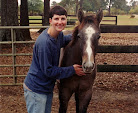I have spent the past week participating in the first half of a 10-day course with Mark Rashid and Crissi McDonald. For this course all the riders have been borrowing horses that live here at Happy Dog Ranch.
For the first few days we practiced aikido in the mornings and rode in
the afternoons. But on the fourth morning we were getting ready to ride
both morning and afternoon.
As we had our post-breakfast meeting
before heading to the barn, one of the women in our course said that
she was a bit dreading riding twice that day. She said she'd been
feeling guilty all week because her horse didn't seem to enjoy being
ridden and now she was feeling even more guilty to ask the horse to go
out with her twice in one day.
When Mark asked her why she
thought the horse didn't want to be ridden, she cited the horse's
unwillingness to be haltered in the paddock, resistance to the bit being
put in, and refusal to stand by the mounting block. She added that she
had encountered these issues with some of her own horses and had been
unable to continue riding them because she couldn't enjoy riding if the
horse seemed unhappy about being ridden.
I wish that I had an
exact record of what Mark said in response because it profoundly changed
my perspective. But here at least is what I remember.
First and most importantly Mark said that we don't know the horse doesn't want to be ridden.
Just that one statement changed the whole conversation.
We tend to get a bit lost in our own stories about what is going on.
But as Mark went on to say, all we really know for sure is that the
horse has certain behaviors (like putting her head in the air when the
bit is offered).
It may be that the horse was handled roughly at
some point in her past and developed these patterns of behavior as a
defensive response. Our job, however, is neither to suss out the horse's
past history nor to figure out what her present behavior might "mean."
It is simply to help her do the things that we are asking in a way that
feels better to her.
We don't achieve this by backing off when
she seems resistant to something. Nothing changes that way. We achieve
it by having a clear idea of how we would like the thing to feel both to
the horse and to the human and then staying with it until she finds
that feel.
Ultimately yes, we require our horses to do things
that they might not choose to do. However we also have the opportunity
to help them find softness and relaxation by finding those things first
in ourselves and then offering them to our horses. And if they then tap
into their own softness and relaxation, we can be fairly confident that,
whether they would have chosen to do that thing or not, they are no
longer bothered by doing it. They might even be happy about doing it.
In short, we have to believe that we can be agents of change in our
horses' lives--that we can be a positive force to help them rather than
just something they put up with because they have no choice.
And
this belief carries over to the whole of life. What if we work from a
space of assuming that we are making a positive impact? What if we keep
in the front of our minds the joy that we have to offer others? What if
we look at the sky at the end of the day and say, "It was a good day. It
started out good, and then I was able to make a couple of things a
little better," and then we enjoy some dinner and go to bed?
August 14, 2016
Subscribe to:
Post Comments (Atom)




No comments:
Post a Comment